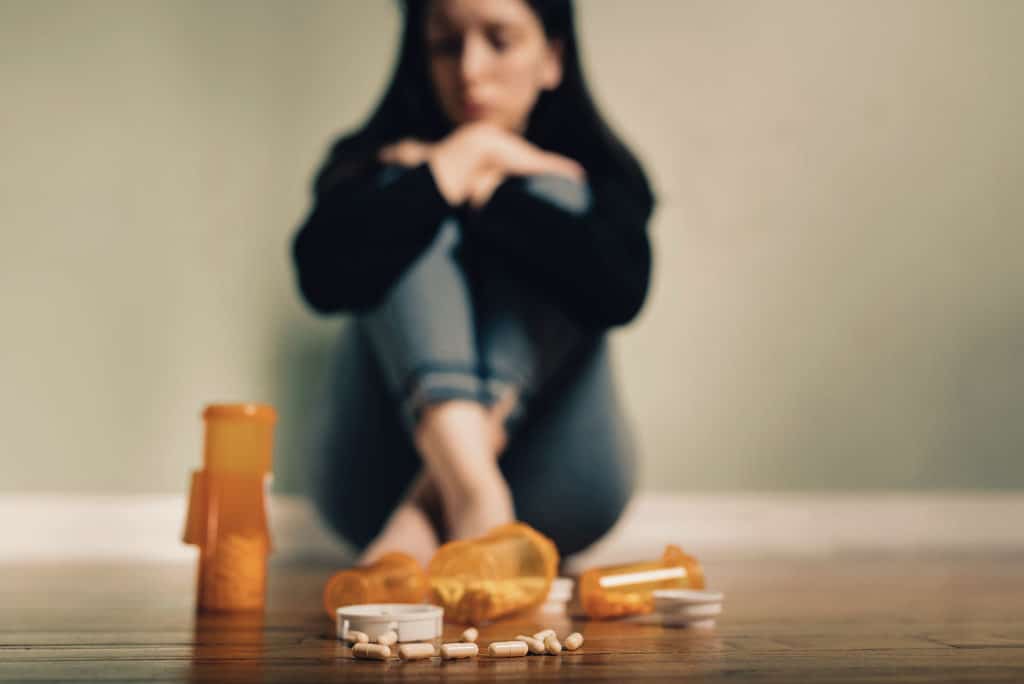For many people struggling with depression, turning to drugs or alcohol can seem like a quick fix. This pattern is more common than most realize. And far more dangerous.
It’s challenging enough to tackle just one issue, but when both depression and substance abuse are present, what does recovery look like for patients?
Is there an effective addiction depression treatment?
In this article, we’ll take a closer look at how these two conditions are connected and what it takes to treat them both at the same time.

Table of Contents
Addiction and Depression: What’s the Connection?
Someone experiencing both mental illness and substance use disorder (SUD) has what’s called a dual diagnosis or co-occurring disorder.
People suffering from depression often turn to substances to self-medicate, hoping for some relief.
Meanwhile, drug or alcohol abuse triggers or worsens depressive symptoms. That’s because both conditions affect the same neurotransmitters that control mood, motivation, and pleasure.
Depression and SUD also share common risk factors, including:
- Genetics
- Trauma
- Stress
- Chronic health problem
What follows is a destructive cycle. One depressive episode leads to substance misuse, which deepens the depression, which leads to more drug or alcohol use.
And the longer this goes on, the more complicated it becomes to treat either condition.
Prevalence of Co-Occurring Substance Use and Mental Health Conditions
The National Survey on Drug Use and Health reported that around 17 million adults in the US were living with both SUD and mental health disorders in 2020.
This isn’t just an issue for adults. Many substance-abusing adolescents present with depressive disorders and are at greater risk of dropping out of treatment and relapsing early.
Experts believe the actual numbers are even higher. According to the National Institute of Mental Health and SAMHSA (Substance Abuse and Mental Health Services Administration), many go undiagnosed because of overlapping symptoms.
Even more concerning, having SUD increases your chances of developing depression or anxiety disorders. Research also shows that those suffering from alcohol use disorder are more likely to have suicidal thoughts or die by suicide.

Depression and Addiction: How to Get Diagnosed
Diagnosing co-occurring disorders is quite tricky since the two conditions share common symptoms, including:
- Poor appetite
- Difficulty concentrating
- Loss of interest and motivation
- Fatigue
- Paranoia
- Mood swings
- Social withdrawal
So, how do you get properly diagnosed?
Mental health professionals use a tool called the DSM-5 (Diagnostic and Statistical Manual of Mental Disorders) as a guide to determine if someone meets the criteria for major depression, SUD, or both.
A full assessment usually involves:
- Full history of alcohol or drug use
- Screening for symptoms of depression
- Identifying any comorbid health issues
- Discussion of treatment options
Clinicians might also use more in-depth diagnostic tools like:
- Psychiatric Research Interview for Substance and Mental Disorders (PRISM)
- Structured Clinical Interview for DSM-5 (SCID-5)
- Symptom Checklist-90-Revised (SCL-90-R)
You can start this process with the help of a psychiatrist or behavioral health practitioner, either in a treatment center or through outpatient services.
Effective Depression and AddictionTreatment
Depression and substance abuse are often tangled together in ways that make recovery more complicated, and all the more urgent.

Treating depression without addressing substance use disorder, or vice versa, is more likely to fail. That’s why a dual diagnosis treatment takes a personalized, comprehensive approach.
1. Detox
Before psychotherapy can begin, it’s often necessary to go through detox, a medically supervised process that helps the body safely rid itself of drugs or alcohol.
Detox can be physically and emotionally intense, especially for those with alcohol use disorder or stimulant dependence.
Because of this, detox is usually done in a residential setting. This way, trained staff can keep a close eye on your health status, help manage withdrawal symptoms, and step in quickly if anything unexpected comes up.
2. Cognitive Behavioral Therapy (CBT)
CBT is one of the most proven tools for treating dual diagnosis. It focuses on how your thoughts affect your behavior, especially the ones that keep you stuck in depression and substance use.
For example, if you constantly feel like you’re not good enough or beyond help, CBT helps you challenge that mindset and form more compassionate beliefs.
CBT can also help individuals learn coping skills and prevent relapse. It’s a key piece of many treatment plans for major depression and SUD.
3. Medication-Assisted Treatment
In most cases, medications are a necessary part of recovery.
For example, antidepressants can be prescribed for those with major depressive disorder or dysthymia to improve mood. People dealing with opioid use disorder may benefit from buprenorphine or methadone to reduce cravings and ease withdrawal symptoms.
For teens with depression and SUD comorbidity, the use of serotonin reuptake inhibitors (SSRIs) is common. However, these medications need to be monitored closely, since they can sometimes increase suicidality.
Because everyone’s situation is different, medication should always be managed by a qualified mental health professional.
The goal is always the same: to make recovery as safe and sustainable as possible.
4. Group Support and Peer Programs
Recovery is hard to do alone. The good news is, you don’t have to. Support groups and peer programs can offer a lifeline for people facing co-occurring disorders.
Peer support programs, whether focused on depression, substance abuse, or dual diagnosis, offer a sense of belonging, encouragement, and accountability.
Local treatment centers often offer peer-led groups or connections to national networks. These programs are especially helpful in the long term, as they reduce isolation and help people keep sober.
5. Family Therapy
When someone is hurting, the impact often ripples out to family members. It only makes sense to involve them in the recovery process.
Family therapy helps loved ones better understand what’s going on and learn how to be truly supportive without enabling harmful behaviors.
It’s also a chance to heal damaged relationships, rebuild trust, and create a more stable, understanding environment for recovery.

Long-Term Recovery and Relapse Prevention
Recovery doesn’t end when a treatment program does.
Once someone finishes detox or inpatient rehab, the next phase is just as important: staying well. That means staying connected to care.
For many people, long-term recovery includes:
- Regular therapy sessions
- Attending support groups
- Monitoring by a mental health professional
- Building a strong support network of loved ones and peers
Remember, relapse prevention involves knowing your triggers, having a plan for when life gets overwhelming, and continuing to invest in your mental and emotional well-being.
Finding Help
The right treatment center specializes in co-occurring disorders, treating both addiction and mental health conditions together, not separately. Asking the right questions can help you decide if their program is the right fit:
- Do they treat mental health disorders and substance use disorders together?
- Is there a licensed psychiatry team on-site?
- Do they offer both inpatient and outpatient options?
- What does the treatment plan look like?
Final Thoughts
Addiction and depression are deeply personal battles. Many people keep it hidden for fear of judgment. Some simply don’t know where to get help.
But you’re not alone. And you don’t have to go through it alone.
Millions of people face these same challenges. What makes the difference is reaching out.
Addiction depression treatment is available, and it works. The right combination of mental health care, therapy, and medical support offers a real chance for lasting healing.
Recovery isn’t instant, but it’s possible. You just need to ask for help.
Sources:
- https://www.nami.org/about-mental-illness/common-with-mental-illness/substance-use-disorders
- https://psycnet.apa.org/record/2019-45844-024
- https://mecp.springeropen.com/articles/10.1186/s43045-020-00029-w
- https://pmc.ncbi.nlm.nih.gov/articles/PMC1089782
- https://childmind.org/article/medication-for-kids-with-depression



